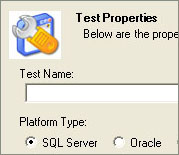Intel Xeon 3.6 2MB vs AMD Opteron 252 Database Test
by Jason Clark & Ross Whitehead on February 14, 2005 8:00 AM EST- Posted in
- IT Computing
SQL Stress Tool Benchmark
Our first benchmark was custom-written in .NET, using ADO.NET to connect to the database. The AnandTech Forums database, which is over 14GB in size at the time of the benchmark, was used as the source database. We'll dub this benchmark tool "SQL Stress Tool" for the purposes of discussing what it does. We have done some updates to the tool since we first used it; it now supports Oracle, and MySQL. We also adjusted the test time for this test and future tests to 20 minutes. The reason for this was to ensure that we used as much memory as possible for future planned 64 bit tests.
SQL Stress allows us to specify the following: an XML based workload file for the test, how long the test should run, and how many threads it should use in which to load the database. The XML workload file contains queries that we want executed against the database, and some random ID generator queries that populate a memory resident array with ID's to be used in conjunction with our workload queries. The purpose of using random ID's is to keep the test as real-world as possible by selecting random data. This test should give us a lot of room for growth, as the workload can be whatever we want in future tests.
Example workload:
Example Random ID Generator:
The workload used for the test was based on every day use of the Forums, which are running FuseTalk. We took the most popular queries and put them in the workload. Functions, such as reading threads and messages, getting user information, inserting threads and messages, and reading private messages, were in the spotlight. Each reiteration of the test was run for 20 minutes, with the first being from a cold boot. SQL was restarted in-between each test that was run consecutively.
The importance of this test is that it is as real world as you can get; for us, the performance in this test directly influences what upgrade decisions we make for our own IT infrastructure.











97 Comments
View All Comments
Carfax - Tuesday, February 15, 2005 - link
Sheesh, the workstation benches still aren't up? :(More people are interested in the workstation benchmarks than database I'd wager because it's a better showcase for the new enhancements.
How long will we have to wait?
Jason Clark - Tuesday, February 15, 2005 - link
snorre, proper? It is proper in terms of the Windows world since 64 bit DOES NOT EXIST :). If you want to see 64bit linux coverage as said in these comments and in the article view the linux section or Johans work in the IT section.snorre - Tuesday, February 15, 2005 - link
I'd like to see a proper Xeon DP 2M vs Opteron 252 review, since MS SQL 32-bit benchmarks are only of limited interest. When will we see this?Are there any proper Opteron 252 reviews out there?
semo - Tuesday, February 15, 2005 - link
#70, you said it. it's the cost. cost is my killer.sure ddr2 costs more than ddr but i hate upgrading my whole setup just to get new momory. right now i'm running a pc133 setup and cannot upgrade even if i wanted to (and believe me... i want to). i know that low latency is what the hammer architecture wants but doesn't regitered memory increase latencies... and what is registered memory anyway?
Jason Clark - Tuesday, February 15, 2005 - link
There was a few questions about single or dual in here, I had answered that but to clarify all testing was DUAL processor.Jason Clark - Tuesday, February 15, 2005 - link
One thing to remember with the Tyan bios is it is pre-production. We'll post info as soon as we have it.Jason Clark - Tuesday, February 15, 2005 - link
We're working with Tyan on the 1GHz HT issue, if we get a new bios that supports it we will re-test and post our results..Cheers.
Viditor - Tuesday, February 15, 2005 - link
"i'm interested in number cruncing and games and rendering, i.e. a workstation not a server"Why would you not want registered memory then? Contrary to popular opinion, it does not affect the speed...only the cost.
For gaming, dual systems are no help at all (unless you're running a game server) with todays software. For professional rendering, you absolutely WANT registered memory!
DDR2 would actually be no speed increase at all for AMD64 systems, and none yet for Intel systems. Not until the memory speeds get much higher will we see any benefit from DDR2...
XDR is also not a good match for the AMD chips because of the high latency. AMD chips are NOT bandwidth constrained but ARE latency sensitive (meaning that increasing memory speeds does very little, while increasing latency makes them much worse).
The only real issue of registered memory is the cost, and if that is the problem I would suggest a high end A64 939 SLI board (e.g. Asus A8N-SLI), and upgrade to dual core in September or so...
semo - Tuesday, February 15, 2005 - link
i'm interested in number cruncing and games and rendering, i.e. a workstation not a server. unforutnately the integrated memory controller of the amd hammers are both their strengths and weaknesses.it's only upto amd whether we can have unregistered, ddr2 or maybe even xdr memory i guess
Viditor - Tuesday, February 15, 2005 - link
"is it possible to have a dual proc setup without using registered memory?"Technically yes...but registered memory is what's preferred for servers because it is more securely accurate. All Opterons use registered memory...
Platforms for the Athlon MP use non-registered memory, and a very few of the Xeon platforms do as well...